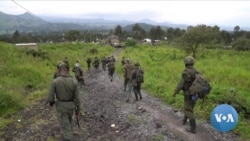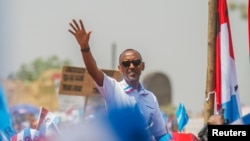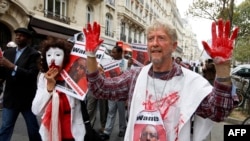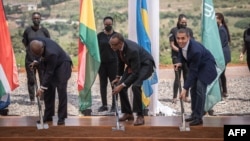The Rwandan government is trying to silence critics and dissidents living overseas through extrajudicial killings, kidnappings and intimidation, according to a report from Human Rights Watch.
The investigation, titled "Join Us or Die: Rwanda's Extraterritorial Repression," includes interviews with more than 150 people in Australia, Belgium, Canada, France, Kenya, Mozambique, South Africa, Tanzania, the United Kingdom, the United States, Uganda and Zambia, and others related to them in Rwanda.
"It is a relentless attack on individuals using a multiplicity of tools and tactics to try and keep people silent," report co-author Yasmine Ahmed told VOA.
Rwandan Patriotic Front
The report notes that Rwanda's President Paul Kagame and his ruling Rwandan Patriotic Front, or RPF, are often credited with rebuilding and reuniting the country after the 1994 genocide.
"However, the RPF, since it came to power in 1994, has also responded forcefully and often violently to criticism, deploying a range of measures to deal with real or suspected opponents, including extrajudicial killings, enforced disappearances, torture, political prosecutions, and unlawful detention, as well as threats, intimidation, harassment, and physical surveillance. Such measures are not limited to critics and opponents within the country," the report said.
"The control, surveillance, and intimidation of Rwandan refugee and diaspora communities and others abroad can be attributed in part to the authorities' desire to quash dissent and maintain control," it added.
Fleeing Rwanda
Human Rights Watch interviewed Noël Zihabamwe, a prominent member of the Rwandan community in Australia. He was a young boy at the time of the 1994 genocide, and saw family and friends killed in the violence.
Ten years later, in 2004, he fled the country after refusing to join Kagame's ruling party, the RPF.
"I know many people have refused to become members [of the ruling party] and end up being jailed or disappearing. So that's how I left Rwanda," Zihabamwe told Human Rights Watch.
After he left, Zihabamwe says his two brothers and his nephew were arrested in Rwanda.
"They put them in the jail and then they tortured them. [My brothers] were with my brother's first son, who was 19. So while they were in that jail they were asking them, "What kind of conversation do you have with Noël? What does Noël do for you? What does Noël tell you? What do you tell him? Tell me if there's any plan that he has for you." So they were pushing them, torturing them to make them to make a false statement," Zihabamwe said.
The two brothers were released but then arrested again in 2019. Zihabamwe has not heard from them since. "There's many, many, many thousands of people who have been disappeared. And they are still missing as we speak today," he said.
Rwanda response
Yolande Makolo, a spokesperson for the Rwandan government, said in a statement:
"Human Rights Watch continues to present a distorted picture of Rwanda that only exists in their imagination."
"Any balanced assessment of Rwanda's record in advancing the rights, wellbeing, and dignity of Rwandans over the past 29 years would recognise remarkable, transformational progress. Rwanda will not be deterred from this work by bad-faith actors advancing a politicised agenda," the statement read.
Global reach
Many of the Rwandan exiles targeted by the government are living elsewhere in Africa, according to the HRW report.
"Human Rights Watch documented five cases of killings, three kidnappings and attempted kidnappings, and at least six cases of physical assaults and beatings – some of which appeared to be attempted killings – of Rwandan permanent residents, refugees, and asylum seekers in Kenya, Mozambique, South Africa, Tanzania, and Uganda."
"In some cases, the perpetrators spoke Kinyarwanda, Rwanda's national language, or were suspected of working for the Rwandan government. Some of the victims were told they would be handed over to Rwanda or were accused of working against the Rwandan government," the report said.
The targeting of critics is not limited to the African continent, says report co-author Yasmine Ahmed.
"We also see it in Europe, where we've seen that there have been threats to life warnings against individuals in the United Kingdom. We've seen individuals who've also had their family members targeted. We've had individuals who've been subject to the misuse of international law enforcement mechanisms," Ahmed told VOA.
Interpol 'Red Notice'
Human Rights Watch accuses Rwanda of abusing Interpol's 'Red Notice' system of international arrest warrants.
The report highlights the case of Eugene Gasana, a former senior RPF official who was part of Kagame's government and Rwanda's permanent representative to the United Nations from 2009 until 2016. Gasana reportedly fell out with President Kagame over Kagame's decision to amend the constitution and run for a third term in the 2017 election.
"[Gasana] was removed from his position as ambassador and summoned back to Kigali. He refused to return and applied for permanent resident status in the U.S. His application was approved on October 4, 2018," the report notes.
Gasana was then accused of rape and sexual harassment by a former employee at the U.N. mission. A criminal investigation was launched by the New York County District Attorney's Office but no charges were brought. A civil lawsuit against Gasana is ongoing.
In 2020, Rwanda's prosecutor general issued an international arrest warrant. "An Interpol Red Notice was issued on August 14, 2020, which Gasana challenged," the Human Rights Watch report noted.
"On June 29, 2021, an Interpol commission reviewed Gasana's request and concluded that "there is a predominant political dimension to this case." The commission ordered his files deleted from Interpol's database, the Human Rights Watch report said.
'Development darling'
Rwanda is seen as a key partner by many Western nations. President Kagame has overseen one of Africa's fastest-growing economies, with annual economic growth averaging between 7 and 8 percent over the past two decades.
The international community has willfully ignored human rights abuses, says Ahmed.
"Rwanda can no longer be viewed as a development darling, as a star in Africa. Rwanda needs to be seen as is for what it is: a government that's wholly repressive, particularly in relation to individuals that have expressed any form of dissent or even suspected of that dissent."
"The time is now, if ever, that the governments across the world must stand up to this repression. Essentially what we're seeing is because of the failure of governments - for their own interests – in standing up to Rwanda, we've seen Rwanda's extensive abuses now being carried out globally," she told VOA.








